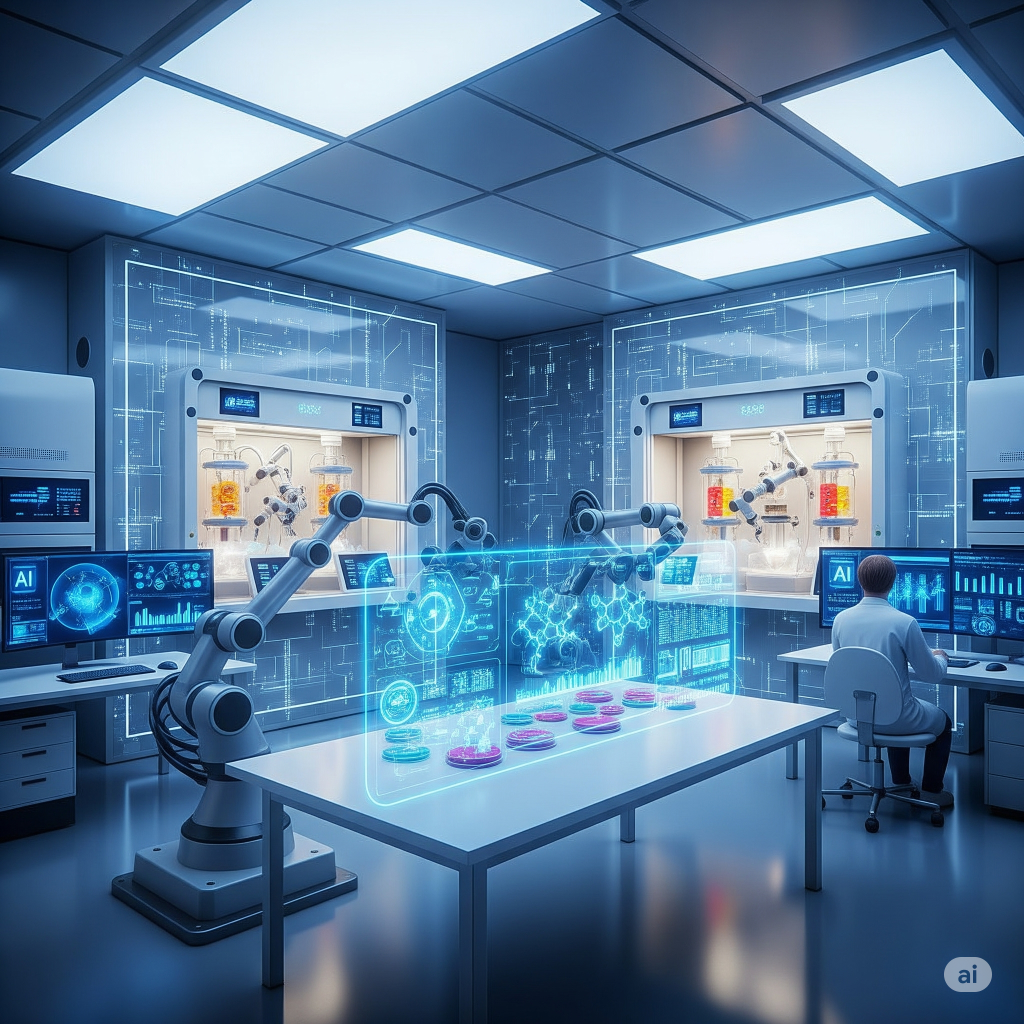Imagine a world where finding life-saving drugs takes months instead of decades, treatments are tailored precisely to your DNA, and medication manufacturing is as smart as your phone. This isn’t science fiction—it’s the reality that Artificial Intelligence (AI) is creating in the pharmaceutical industry.
AI is transforming the healthcare landscape at an astonishing pace, especially in pharma. From drug discovery and development to clinical trials and personalized medicine, AI is driving efficiency, innovation, and accessibility like never before. It’s becoming the game-changer the pharmaceutical industry has been waiting for, and it’s completely changing the future of medicine.

Accelerating Drug Discovery with AI
The traditional drug discovery process can take 10 to 15 years and cost over $2 billion just to bring one drug to market. AI dramatically cuts that timeline and cost. How? AI algorithms analyze vast datasets of chemical structures, biological activity, and genomics to identify potential drug candidates. Machine learning models can even simulate how new compounds might interact with the human body—all without a single step into a lab.
This has a real-world impact. Google’s DeepMind developed AlphaFold, a program that predicts protein structures with remarkable accuracy, unlocking new pathways for drug development. Another example is Insilico Medicine, which used AI to identify a novel drug candidate for fibrosis in just 46 days. By helping researchers focus on the most promising leads, AI is reducing the time, cost, and failure rates associated with this crucial first step.
Personalized Medicine: One Size No Longer Fits All
Every patient is unique, and their treatment should be too. AI allows for precision medicine by analyzing individual data like genetic profiles, medical history, and lifestyle. AI models can then suggest the treatments most likely to work for a specific patient, moving away from the traditional trial-and-error approach.
This approach offers increased treatment effectiveness, reduced side effects, and faster recovery times. This is especially valuable in oncology, where AI helps doctors tailor cancer treatments based on tumor genomics and patient response predictions.
Smarter Clinical Trials with AI
Clinical trials are essential but are often time-consuming and expensive. Many trials fail due to poor participant selection or unpredicted side effects. AI optimizes this process by:
- Identifying ideal candidates through the analysis of electronic health records and population data.
- Predicting trial outcomes using historical data trends.
- Monitoring patient adherence and safety in real time.
Pharmaceutical companies are already using AI to cut trial costs by 20–30% while also increasing the chances of a drug’s success.
AI in Pharmaceutical Manufacturing
Once a drug is approved, AI plays a key role in ensuring its quality, scalability, and safety. AI-powered systems help to:
- Detect anomalies during production.
- Predict maintenance needs in manufacturing lines before they cause a problem.
- Optimize inventory and supply chain logistics.
This leads to faster production cycles, reduced human error, and more consistent drug quality. This “smart manufacturing” also supports regulatory compliance, improving trust in pharmaceutical processes.
Ethical Considerations and Challenges
While the benefits of AI in pharma are immense, it’s important to proceed with caution. The key challenges ahead include:
- Data Privacy: Patient and genomic data must be handled securely and ethically.
- Bias in AI Models: AI is only as unbiased as the data it’s trained on. Flawed data can lead to skewed results that could have dangerous consequences.
- Regulatory Oversight: Governments and agencies are still catching up with how to evaluate and approve AI-driven decisions in medicine.
Ethical AI isn’t just a good idea; it’s a necessity in a field that directly impacts human lives.
The Future: A New Era of Healthcare
The future of pharmaceuticals will likely be defined by collaborations between AI startups, healthcare providers, and regulatory bodies. We can expect to see AI-designed vaccines and antibiotics, real-time global epidemic forecasting, and fully AI-managed virtual clinical trials. The convergence of AI and biotechnology is only just beginning, and it promises to usher in a new era of healthcare that is faster, safer, and smarter.
Artificial Intelligence isn’t just improving the pharmaceutical industry—it’s revolutionizing it. From speeding up drug discovery to personalizing treatments and enhancing manufacturing, AI is changing the way we create and deliver medicine. The next time you take a prescription, there’s a good chance AI had a hand in making it more effective and accessible. The fusion of technology and healthcare is no longer the future—it’s the present, and it’s already saving lives.

Leave a Reply